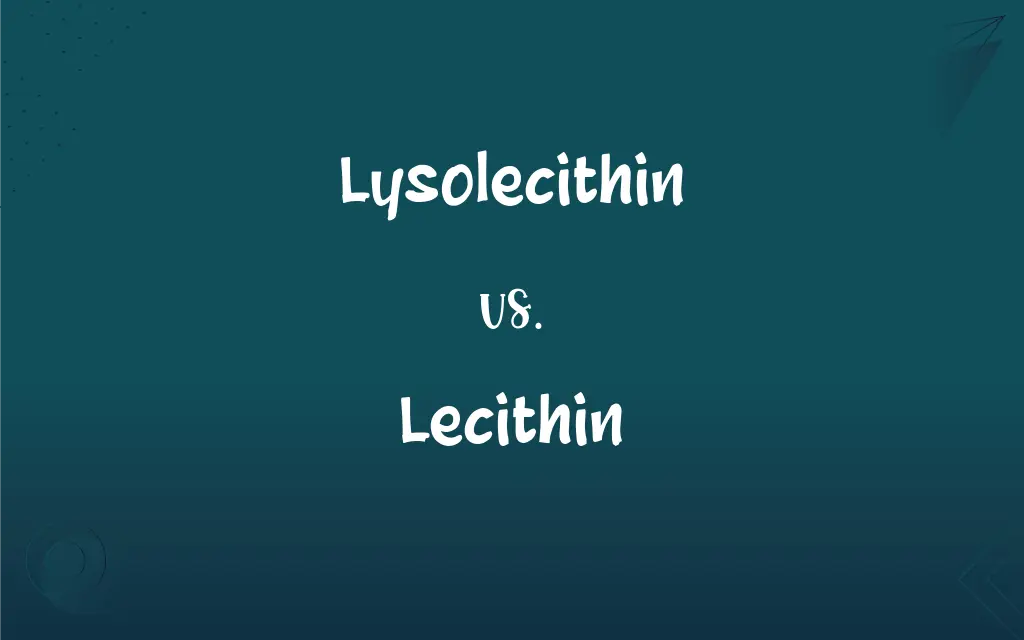Lysolecithin vs. Lecithin: What's the Difference?
Edited by Harlon Moss || By Janet White || Updated on October 12, 2023
Lysolecithin is a breakdown product of lecithin often formed by enzyme action, while lecithin is a fatty substance found in animal and plant tissues, commonly used as a food additive.

Key Differences
Lysolecithin and lecithin are both lipid molecules, but they differ in their structure and function. Lecithin is a phospholipid, primarily known for its presence in cell membranes and its use in food as an emulsifier. It's found in various sources, including soybeans and egg yolks. In contrast, lysolecithin is a product formed from the enzymatic breakdown of lecithin, especially by the action of phospholipase.
Discussing their roles, lecithin plays a crucial part in maintaining cell membrane integrity and facilitating cell signaling. On the other hand, lysolecithin has been studied for its potential role in demyelination, a process involved in some neurodegenerative diseases. While lecithin supports cellular health, lysolecithin can be detrimental under certain conditions.
In the food industry, lecithin is often used as a natural emulsifier, helping in mixing oil and water in products. Lysolecithin, with its different properties, isn't typically used in the same way. Lecithin ensures consistency in products, while lysolecithin doesn't have a broad commercial application.
To wrap up, while both lysolecithin and lecithin are related lipids, they are differentiated by their origin, function, and application. Lecithin is widely recognized for its positive roles in food and biology, whereas lysolecithin stands out mainly in a more specific scientific context.
Comparison Chart
Origin
Enzymatic breakdown of lecithin.
Naturally found in animal and plant tissues.
ADVERTISEMENT
Function
Involved in demyelination processes.
Maintains cell membrane integrity.
Usage in Food
Not commonly used.
Used as an emulsifier.
Associated Risk
Can be detrimental in specific contexts.
Generally considered safe.
Commercial Role
Limited commercial application.
Widely used in food and supplements.
Lysolecithin and Lecithin Definitions
Lysolecithin
A product of lecithin's enzymatic breakdown.
The presence of lysolecithin can indicate enzymatic activity in a sample.
ADVERTISEMENT
Lecithin
Can be derived from various natural sources.
Many food companies opt for soy-derived lecithin in their products.
Lysolecithin
Not typically used as a food additive.
While lecithin is common in foods, lysolecithin isn't usually an ingredient.
Lecithin
Plays a crucial role in cell membrane structure.
Cellular health is often linked to the functions of lecithin.
Lysolecithin
Formed particularly by the action of phospholipase on lecithin.
Phospholipase enzymes can break down lecithin to produce lysolecithin.
Lecithin
Commonly utilized in dietary supplements.
For potential health benefits, many people take lecithin supplements.
Lysolecithin
A lipid molecule associated with demyelination.
Researchers study lysolecithin's role in certain neurodegenerative diseases.
Lecithin
A fatty substance found in animal and plant tissues.
Lecithin is abundantly found in egg yolks and soybeans.
Lysolecithin
Less commercially recognized than lecithin.
Lecithin's commercial footprint overshadows that of lysolecithin.
Lecithin
A natural emulsifier used in the food industry.
To achieve the right texture in some chocolates, lecithin is added.
Lysolecithin
(organic chemistry) Any lysophospholipid derived from lecithin
Lecithin
Any of various substances containing phosphatidylcholine and a variety of other phospholipids, extracted from soybeans, egg yolks, or other sources and used as emulsifiers in a wide range of commercial products, including foods, cosmetics, paints, and plastics.
Lecithin
See phosphatidylcholine.
Lecithin
(organic chemistry) The principal phospholipid in animals; it is particularly abundant in egg yolks, and is extracted commercially from soy. It is a major constituent of cell membranes, and is commonly used as a food additive (as an emulsifier).
Lecithin
A complex, nitrogenous phosphorized substance widely distributed through the animal body, and especially conspicuous in the brain and nerve tissue, in yolk of eggs, and in the white blood corpuscles.
Lecithin
A yellow phospholipid essential for the metabolism of fats; found in egg yolk and in many plant and animal cells; used commercially as an emulsifier
FAQs
And lecithin?
Lecithin is a fatty substance found in animal and plant tissues, often used in food and supplements.
What is lysolecithin?
It's a breakdown product of lecithin, formed especially by enzyme action.
Does lysolecithin occur naturally like lecithin?
Lysolecithin is typically a result of enzymatic breakdown of lecithin rather than being directly sourced from nature.
Where is lecithin commonly found?
In egg yolks, soybeans, and various animal tissues.
Is lysolecithin similar to lecithin?
They are related but differ in origin, function, and use.
Is lysolecithin used in the food industry?
Not as commonly as lecithin, which is a frequent food additive.
Why is lecithin added to food?
As an emulsifier, it helps mix oil and water in products.
Are both considered safe for consumption?
Lecithin is generally safe, while lysolecithin isn't typically consumed.
Is lysolecithin ever beneficial?
In scientific contexts, it helps study certain biological processes.
Do they both have the same health implications?
No, lecithin is often seen positively, while lysolecithin can be involved in detrimental processes.
What's the role of lecithin in cells?
It helps maintain the integrity of cell membranes.
Can one replace the other in applications?
No, they have distinct roles and aren't directly interchangeable.
Which one is more commonly recognized?
Lecithin is more widely recognized, especially in food and health sectors.
Does lysolecithin have a role in health conditions?
It's associated with demyelination, seen in some neurodegenerative diseases.
How is lysolecithin produced?
Primarily through the enzymatic action of phospholipase on lecithin.
How are they pronounced?
"Lys-oh-LESS-i-thin", Lecithin: "LESS-i-thin."
Do both have commercial importance?
Lecithin more so due to its widespread use, while lysolecithin has limited commercial relevance.
Are they both lipids?
Yes, both are lipid molecules.
Can you find both in everyday products?
Lecithin is more likely, especially in foods, while lysolecithin is not commonly encountered.
Why might someone take a lecithin supplement?
For potential health benefits and to support cellular function.
About Author
Written by
Janet WhiteJanet White has been an esteemed writer and blogger for Difference Wiki. Holding a Master's degree in Science and Medical Journalism from the prestigious Boston University, she has consistently demonstrated her expertise and passion for her field. When she's not immersed in her work, Janet relishes her time exercising, delving into a good book, and cherishing moments with friends and family.
Edited by
Harlon MossHarlon is a seasoned quality moderator and accomplished content writer for Difference Wiki. An alumnus of the prestigious University of California, he earned his degree in Computer Science. Leveraging his academic background, Harlon brings a meticulous and informed perspective to his work, ensuring content accuracy and excellence.































































